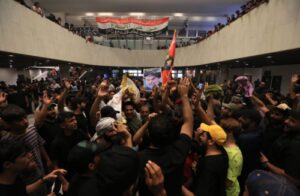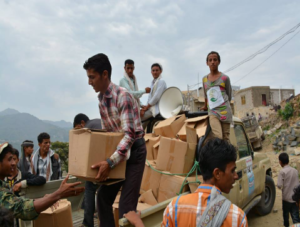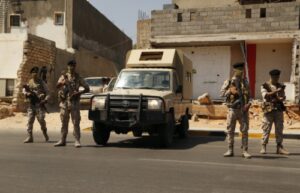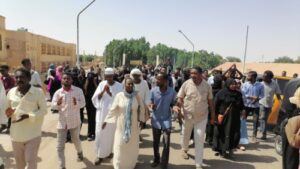
The National Interest Foundation Newsletter
Issue 158, September 1, 2022
Welcome to our NIF Newsletter. In this week’s headlines: concern regarding exacerbating tensions in Iraq emerges in the aftermath of populist leader Muqtada al-Sadr’s latest announced withdrawal from politics, rights groups urge Yemen’s Houthi rebels to end the Taiz blockade due to the hindrance it has had on the flow of humanitarian aid, deadly clashes between rival factions in Libya elicit fears of renewed conflict, and Sudanese journalists form an independent union in an attempt to defend freedoms that have been curtailed by the country’s military coup.
Concern Regarding Violence in Iraq

Following an announcement by populist leader Muqtada al-Sadr that he is abandoning politics, a deadlocked Iraqi state edges closer to total collapse. (Photo from Anadolu Agency)
Concern Regarding Exacerbating Tensions in Iraq Emerges in the Aftermath of Populist Leader Muqtada al-Sadr’s Latest Announced Withdrawal from Politics
Since October of last year, Iraq has found itself mired by uncertainty and political paralysis as rival opponents vie for power. The two sides have similar religious character, but different political viewpoints, the largest and most significant difference being the place that Iraq’s Shiite neighbor, Iran, has in Iraq’s future. On one side lies a pro-Iranian coalition of militias and interest groups, the most prominent of which is the Coordination Framework, led by Nouri al-Malaki, former prime minister. On the other lies a group known as the Sadrists, led by Muqtada al-Sadr. A month ago, al-Sadr supporters formed a tent village around the government palace to prevent a governmental meeting spearheaded by the Coordination Framework that would have concerned the dissolution of the current parliament and how to institute early elections, two issues on which the Sadrists and the Coordination Framework vehemently disagree. The blockade was successful, and since then, all had been quiet, albeit tense. However, the tentative calm was shattered earlier this week on Monday when al-Sadr announced his decision to step away from politics. The statement threw staunch supporters into a frenzy, prompting hundreds to storm the palace, drawing fire from security forces. That night, a Sadrist militia went toe-to-toe with an Iranian-backed one in another part of the Green Zone, and in several southern provinces, pro-al-Sadr protests erupted. Fighting continued until Tuesday, when al-Sadr asked his followers to put down their arms and leave the tent blockade. At least 30 were killed and 400 were injured in total.
That a similar or worse conflict will take place in the near future is not only likely, but almost certain. The event once again showcased the immense sway that al-Sadr holds over his followers, as well as the danger they possess in his absence. Whether or not al-Sadr is truly walking away remains uncertain, as this is far from the first time that al-Sadr has withdrawn from politics only to return shortly thereafter. In fact, some believe that al-Sadr periodically announces such “retirements” only to demonstrate what may happen if he is not put in power. But it may be that there is more legitimacy – or at least reason – behind his most recent step back from politics. Popular Shiite religious leader Ayatollah Kadhim al-Haeri retired on Sunday, who shares many of the same followers as al-Sadr. Rather than urge Iraqi Shiites to search for religious guidance from another source within Iraq, al-Haeri told his followers to give their support to Ayatollah Ali Khamenei of Iran. Being that al-Sadr is adamantly anti-Iran, it could weaken his following.
Aside from Iran, other international actors have done little. Among the minority groups in the country, namely the Sunnis and the Kurds, there appears to be little to no hope that Iraq can evade civil war. “Unfortunately, I do not see a secure and prosperous future for my country,” said political scientist Moayed Jubeir Al-Mahmoud to the New York Times.
Additionally, there is no indication that Iraq’s political paralysis will come to an end any time soon, unless of course it is ended by war. For 10 months, the two sides have essentially done nothing but prevent each other from making any form of progress. Al-Sadr’s initial bid at taking power legitimately was blocked when he won the most seats in October, but failed to obtain a majority. Upon his failure to seize power, al-Sadr’s followers in the legislature left in solidarity. Most recently, of course, was the attempt by the Coordination Framework to convene a governmental session, which was halted by the Sadrist blockade. Since fighting ceased on Tuesday, it has again appeared that peace is restored, but no one can say for how long.
Rights Groups Push for End of Taiz Blockade

Observers have stressed the importance of continuing to provide much-needed humanitarian aid services to civilians in Yemen. (Photo from AP)
Rights Groups Urge Yemen’s Houthi Rebels to End the Taiz Blockade Due to the Hindrance It Has Had on the Flow of Humanitarian Aid
In one of the latest developments regarding Yemen, sixteen rights groups including prominent organizations like Human Rights Watch and Amnesty International have urged for the Taiz blockade to be removed to allow aid to better flow into the city and surrounding region. Theblockade has been imposed by the Houthi rebels since early 2016, after they seized Sanaa and much of northern Yemen. The negative impacts of the conflict in Yemen over the past eight years has thrown the country into one of the worst humanitarian crises in recent times, resulting in widespread hunger, disease, and brutal attacks on civilians that have claimed thousands of lives. Experts point out that the Taiz blockade has only exacerbated the already critical situation in Yemen, restricting freedom of movement and impeding the flow of essential goods, medicine, and humanitarian aid to the city’s residents. Most water reserves are depleting or have been completely depleted, and as such, civilians have had to rely on water trucks from outside the city as a critical lifeline.
Due to the unique geographical location of the city, the blockade has trapped citizens inside. The restrictions imposed by the Houthis has forced civilians to use unkept and dangerous mountain roads that are the only connection between the city of Taiz and the surrounding areas. Houthi-manned checkpoints impede residents from gaining access to essential items such as fruit, vegetables, cooking gas, dialysis treatment packets, and oxygen cylinders. These restrictions have also driven up prices of essential goods that are already lacking in the city, as they have become scarce. Well over 11.7 million individuals in Yemen are living in poverty due to the longstanding conflict. The Taiz province is the junction between two crucially-important highways: an east-west road leading to the coastal city of Mocha on the Red Sea, and another north-south one to Sanaa via the Dhamar and Ibb provinces. The closure of these roads has incapacitated the city as the trip between Taiz city and Al Hawban now takes five or six hours on rugged mountainous roads.
For the Houthis, the primary concern for them is that unblocking the roads will open the door for Yemen’s army to mobilize in Taiz and attempt to regain a foothold in Sanaa. Rights activists point out though that the Houthis have an opportunity to show good faith by allowing humanitarian efforts to more easily enter the region and provide much-needed aid for civilians. In the negotiations for the ongoing 2022 truce, the United Nations floated a proposal to open the roads, with both civil society groups and government entities asking for this during a first round of discussions in an attempt to help ease aid deliveries and the movement of residents. This could have significantly alleviated the suffering of many civilians in the war-torn country.
Instead, the Houthis raised their ceiling of demands and set hard-to-meet conditions, such as insisting that government security forces must leave Taiz before they lift the siege. Even in the face of these obstacles and difficulties, the landmark truce in Yemen was recently extended until the 2nd of October. The extension included a commitment by both the government and Houthis to intensify negotiations to reach an expanded agreement as soon as possible. The truce has been rightfully outlined as a positive development, and the hopes of reopening roads in Taiz would also drastically improve the lives of millions of civilians by bolstering access to food, healthcare, and other humanitarian services.
Fears of Renewed Conflict in Libya

This past weekend saw deadly clashes in the Libyan capital city of Tripoli, sparking concern regarding renewed conflict. (Photo from AP)
Deadly Clashes Between Rival Factions in Libya Elicit Fears of Renewed Conflict
Deadly clashes and troubling violence in Libya’s capital city of Tripoli was reignited this past Saturday, eliciting fears of the potential for renewed conflict. The fighting was the worst the country has faced in two years and drew concerns among peace activists and other observers that it could plunge the nation back into a full-blown war. The latest clashes were triggered by fighters aligned with the parliament-backed administration of Fathi Bashagha firing on a convoy in the capital while other pro-Bashagha units massed outside the city. A group affiliated with Prime Minister Dbeibah then stormed a military base belonging to entities tied with the parallel government of Bashagha. Impartial analysts point to the destructive role that Libyan warlord Khalifa Haftar and his forces have played in fueling instability in Libya, with the eastern-based administration’s rival claim to power festering and coming to a head. In the past, Haftar launched an offensive aimed at seizing Tripoli from the internationally-recognized government based there, and the indefinite postponement of initially-planned December 2021 elections in Libya has left rival administrations claiming to hold legitimate power with the potential existing for outbreaks of violence like that which transpired this past weekend.
The Libyan warlord, Khalifa Haftar, who led a months-long assault against the country’s legitimate authority was one of the controversial figures who tried to run for president back in late 2021. Concerns over this and disagreements over the rules and procedures for the elections resulted in them being postponed. Khalifa Haftar was reintroduced to Libya through Cairo where he emulated Qaddafi’s military-style dictatorship. Cairo supplied Haftar with weapons in violation of the UN-arms embargo on Libya. Haftar’s involvement in the post-Qaddafi crisis worsened divisions among Libyans, and as citizens were scheduled to head to the polls in late 2021 for elections, after months of uncertainty in the lead-up they were called off. The divided political classes could not agree on the rules of the election, and there was particular alarm with some of those who were trying to run including Haftar, who had engaged in war crimes and major human rights violations.
Foreign influence has also affected Libya as geopolitical, economic, and ideological reasons have attracted external actors. Outside forces have continued to drive tensions and rival claims to power, with regimes in Egypt and the United Arab Emirates playing especially destabilizing roles. Libya’s deep-water ports provide a chance to control a substantial sea area and vital trade routes. The country is also an important energy power, and has one of the world’s most productive oil fields as well as natural gas and solar power potential. Turkey and Qatar were two of the foreign actors who provided support for the internationally-recognized government based in Tripoli. Turkey gave them aerial superiority over Haftar’s forces with advanced military equipment, including drones. This allowed the internationally-recognized government to retake strategic outposts in the west and south of Tripoli. An eventual ceasefire was put in place which halted Haftar’s siege on Tripoli, but underlying tensions have persisted and been exacerbated by a failure to hold elections and thus two rival claims to power in Libya.
Sudanese Journalists Form an Independent Union

Journalists in Sudan have taken action to move the country’s pro-democracy movement another step forward in the face of an oppressive regime. (Photo from Reuters)
Sudanese Journalists Form an Independent Union in an Attempt to Defend Freedoms That Have Been Curtailed by the Country’s Military Coup
Over the preceding week, a revived independent journalist union in militarily-led Sudan elected an executive board, including a director. This is the first time such an independent union has existed in the country since the dissolution of all such groups back in 1989, when former despot Omar al-Bashir came into power. The group is a sizable one, consisting of 1,164 members, 659 of which participated in this past Sunday’s election. The formation of the syndicate has given newfound hope to many that the democratic movement is in fact making progress. The elected chair of the board, Abdelmoniem Abu Idrees, commented on the historic nature of the vote and added that “it was a notable day for the unions, a day in which we exercised our democracy under a military rule and despite all the manacles that prevented us from doing so.” He also expressed his belief that other professions would follow suit as well.
It is important to note that the optimism brought forth by the journalists’ union is not founded on faith alone, but also on historical precedent. In the past, unions like this have been instrumental in the toppling of other undemocratic regimes in Sudan. For example, a syndicate called the Sudanese Professionals Association – an organization that consisted of educators, doctors, and others – was paramount in the deposition of former dictator Omar al-Bashir back in 2019. However, they were not alone, and the latest journalists’ union will need additional support as well. Still, the self-liberation of the journalists specifically is significant, as they have long been a group under heavy government scrutiny and persecution for utilizing free speech. Many have been forced into silence or compelled to write only that which the government allows.
The hope is that the independence of the union will allow for a broader circulation of the truth and freedom of thought. The freedom of the Sudanese press has even gained international attention from other journalists, such as those in Egypt. Hussein al-Zanati, a prominent Egyptian journalist who is part of the Egyptian Journalist Syndicate Council, is one who has spoken in support of efforts for press freedom in neighboring Sudan. The group has voiced that it “supports and welcomes any entity that seeks to preserve the interests and rights of journalists in all Arab countries.”
In addition to press freedom, the journalists’ syndicate in Sudan is advocating for other benefits they feel belong in a free and democratic society, such as paid maternity leave and greater equality between men and women. The newly-formed union has already made it a requirement that the executive board be at least 40% female. It is also encouraging to note that although the emergence of the journalists’ union is the most recent addition to the pro-democracy movement’s arsenal, many Sudanese have been actively resisting the current military coup via coordinated efforts of separate neighborhood committees since the regime first installed itself back in October of 2021. In February of this year, they demanded that they be allowed to choose a prime minister and that Abdel Fattah al-Burhan – the head of the regime – be removed as commander of the army. However, it is incredibly important to the resistance that they remain non-violent, in keeping with their belief in promoting democracy to create peace. As one pro-democracy movement member put it, “the security agencies are trying to drag our revolution down a violent path, but our revolution always was – and will forever be – peaceful.”
